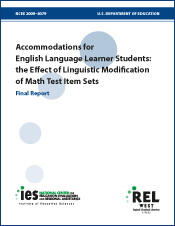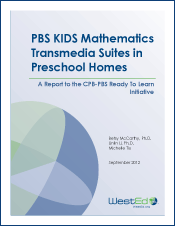Accommodations for English Language Learner Students: The Effect of Linguistic Modification of Math Test Item Sets
Description
This study, prepared by Regional Educational Laboratory West at WestEd, found that simplifying the language—or linguistic modification—on standardized math test items made it easier for English language learners to focus on and grasp math concepts, and thus was a more accurate assessment of their math skills. The results contribute to the body of knowledge informing assessment practices and accommodations appropriate for English language learner students.
The study examined students’ performance on two sets of math items—both the originally worded items and those that had been modified. Researchers analyzed results from three subgroups of students—English learner (EL), non-English language arts proficient (NEP), and English language arts proficient (EP) students.
Key results include:
- Linguistically modifying the language of mathematics test items did not change the math knowledge being assessed.
- The effect of linguistic modification on students’ math performance varied between the three student subgroups. The results also varied depending on how scores were calculated for each student.
- For each of the four scoring approaches analyzed, the effect of linguistic modification was greatest for EL students, followed by NEP and EP students.
Information about the regional educational laboratory (REL) system and other REL publications can be found at the National Regional Educational Laboratory Program website.
Resource Details
Product Information
Format: PDFPages: 204
Publisher: U.S. Department of Education, Institute of Education Sciences
Stay Connected
Subscribe to the E-Bulletin and receive regular updates on research, free resources, solutions, and job postings from WestEd.
Your download will be available after you subscribe, or choose no thanks.







